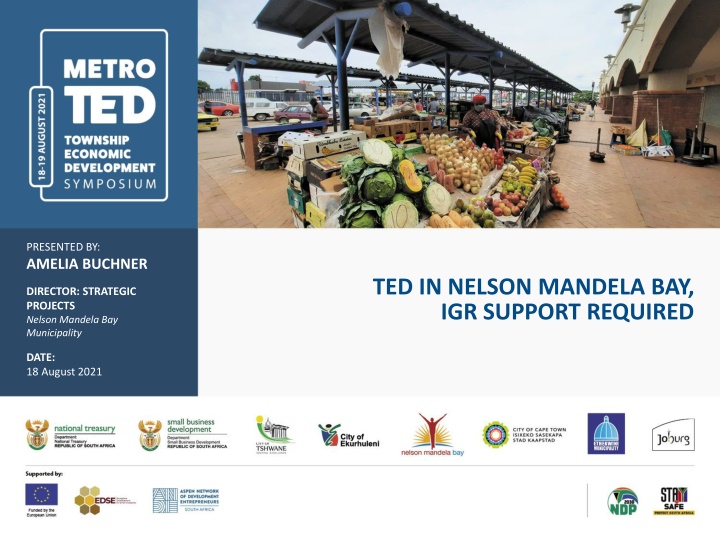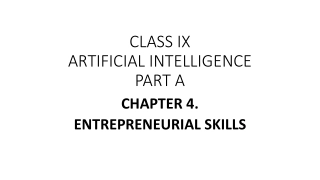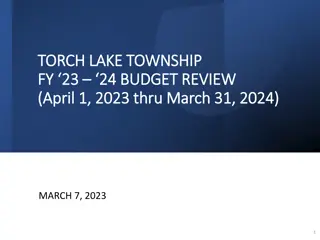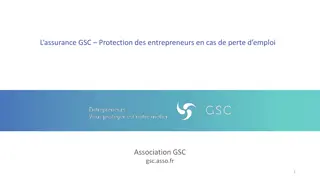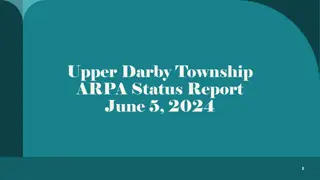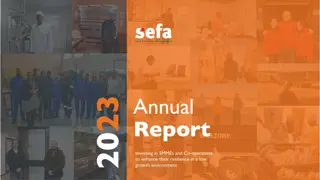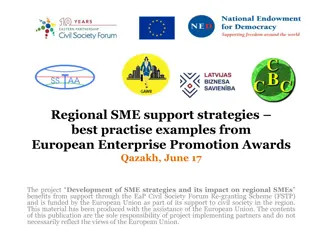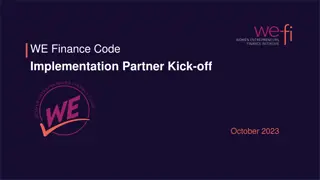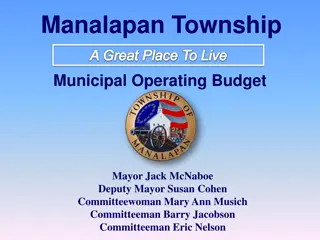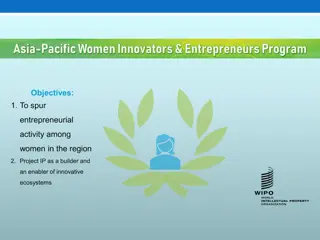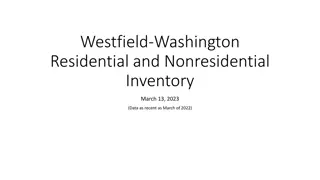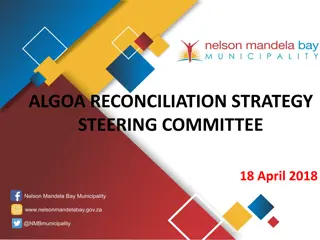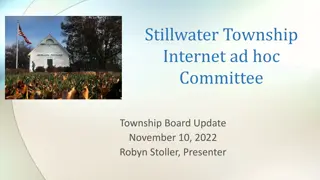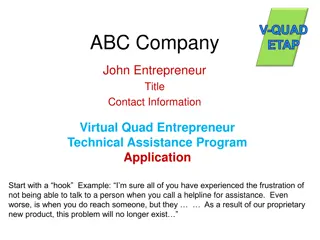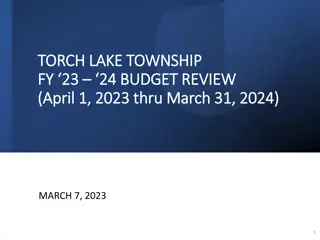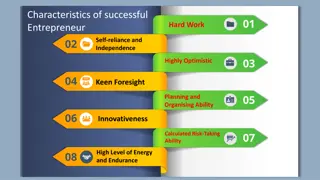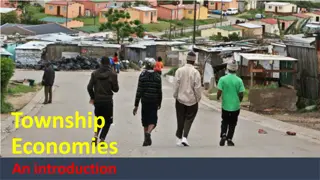Challenges Faced by Township Entrepreneurs in NMBM
The challenges faced by entrepreneurs in townships of Nelson Mandela Bay Municipality include lack of facilities, skills, market access, and government support. Initiatives are needed to provide training, mentorship, and infrastructure to support these entrepreneurs in building sustainable businesses and overcoming obstacles.
Download Presentation

Please find below an Image/Link to download the presentation.
The content on the website is provided AS IS for your information and personal use only. It may not be sold, licensed, or shared on other websites without obtaining consent from the author.If you encounter any issues during the download, it is possible that the publisher has removed the file from their server.
You are allowed to download the files provided on this website for personal or commercial use, subject to the condition that they are used lawfully. All files are the property of their respective owners.
The content on the website is provided AS IS for your information and personal use only. It may not be sold, licensed, or shared on other websites without obtaining consent from the author.
E N D
Presentation Transcript
PRESENTED BY: AMELIA BUCHNER TED IN NELSON MANDELA BAY, IGR SUPPORT REQUIRED DIRECTOR: STRATEGIC PROJECTS Nelson Mandela Bay Municipality DATE: 18 August 2021
INTER-GOVERNMENTAL DIALOGUE: CITY TED AND IPR PRIORITIES I am going to structure my talk under the following headings: 1. The general profile of NMBM townships (TED) 2. Challenges that entrepreneurs face in the townships (TED) 3. What has NMBM done about the townships / NMBM interventions: Program and Initiatives (TED) 4. The general profile of our Industrial areas (IPR) 5. What is needed to revitalise our industrial areas (IPR) 6. IGR required in support to help build the economy? 2
THE GENERAL PROFILE OF OUR TOWNSHIPS The profile of townships in NMBM is probably not much different to the rest of the country. In most NMBM township areas the following applies: More than 60% under 35 years old; Less than 30% completed Grade 12, equivalent or more; More than 20% of 16 to 65 year olds unemployed; More than 25% of households earn less than R800 p/m; More than 20% of people live in informal housing; More than 20% of people have no electricity; More than 10% people use bucket toilets 3
CHALLENGES THAT ENTREPRENEURS IN THE TOWNSHIPS FACE There is a need for facilities / better facilities to do business and provide them with training on how to run their businesses better, how to create networks that will be advantageous to their business. Many of the township entrepreneurs do not have skills to run their business efficiently (both soft and technical skills)- There is a need for entrepreneurship development programmes, which caters for technical, business development and interpersonal skills. 4
CHALLENGES THAT ENTREPRENEURS IN THE TOWNSHIPS FACE (CONT.) Government business support services are far from the townships - Government should partner with the private sector as well as pioneer black business people to provide the mentoring and coaching of emerging entrepreneurs. In business, as in other things in life, role-modelling plays a crucial role in shaping those. There is a lack of market/market access and information to sell their products- There is a lack of operating facilities/spaces/land within the township. 5
CHALLENGES THAT ENTREPRENEURS IN THE TOWNSHIPS FACE (CONT.) There are concerns about responses by government officials in dealing with entrepreneurs and aspirant ones- harassment to those who trade outside the demarcated zones. Lack of alignment and cooperation between the provincial government, local government and private sector in identifying land and vacant buildings that can be converted into operating facilities for SMMEs in the township. 6
CHALLENGES THAT ENTREPRENEURS IN THE TOWNSHIPS FACE (CONT.) Lack of robust legislation and regulatory framework and implementation for government to create markets for emerging entrepreneurs, in particular in products, where the government is a major buyer- For instance, food that is commonly used in feeding schemes in hospitals and schools, clothing, footwear, textile and leather, building materials, furniture and so forth. The other problems are related to the provision of municipal and government services such connectivity, water, sanitation, and electricity. 7
WHAT HAS NMBM DONE ABOUT THE TOWNSHIPS / NMBM INTERVENTIONS: PROGRAM AND INITIATIVES Since 2017 we are addressing the issues in a more organised and focused manner. The Long- Term Growth and Development Plan 2017 2032 was developed. The plan makes specific mention of sectors of strategic importance: agriculture; green economy; tourism; manufacturing; SMMEs; services and transport. The initiatives that were implemented and still operational are: Informal Trader Helpdesk: Trade permits, facilities and rezoned sites for trading, data & knowledge, skills and equipment; 8
NMBM INTERVENTIONS: PROGRAM AND INITIATIVES (CONT.) Youth Entrepreneurship Help desk: Waste Management, Coca-Cola business in a box initiative Automotive sector Helpdesk: GUD/ FILPRO for Township based SMMEs Enterprise Development Center for SMMEs at EDTA (NCI, I-HUB, Business Place, SKBC-30% set aside); Township Tourism Development Initiatives: Heritage sites, Routes, Crafts (Walmer, Northern Areas, Motherwell, Uitenhage and New Brighton); 9
NMBM INTERVENTIONS: PROGRAM AND INITIATIVES (CONT.) Smart City and Establishment of Township based ICT Hubs. In 2019 the Metro developed the Township Economy Revitalisation (TER) strategy, which sets out the development principles and protocols to guide institutional decision-making processes. Then came COVID-19 pandemic. In 2020 there has been little further development of the TER. BUT COVID-19 brought re-focusing and re- prioritising. 10
NMBM INTERVENTIONS: PROGRAM AND INITIATIVES (CONT.) NMBM prepared an Economic Recovery Framework and Strategic Implementation Plan to assist with the devastating effect of COVID on the local economy. In line with the Economic Recovery Framework, the Implementation Plan is focussed on six strategic Intervention Programmes which are: Industry Support and Growth Strategic/Catalytic projects Enterprise Development and Support Poverty Alleviation and Social Programme Township Economy and Key Enablers Infrastructure, Skills Development, Safety and Security and policy 11
NMBM INTERVENTIONS: PROGRAM AND INITIATIVES (CONT.) To show commitment to economic recovery, NMBM has done the following: Over R22 million has been allocated in the current financial year (2021/22) towards the implementation of Economic Development initiatives targeting specific sectors and industries (Construction, ICT, SMMEs, Informal Traders, Tourism and Destination Marketing amongst others). Made an additional R2.5 million per financial year (for 2021/22 2023/24) available for NMBM s Incentives Fund in order to attract and secure further labour- intensive domestic and foreign business investment to the City. 12
NMBM INTERVENTIONS: PROGRAM AND INITIATIVES (CONT.) Made R8 million available in the current financial year for the Township Economic Development Initiatives targeting Informal Traders and SMMEs in the automotive, manufacturing, tourism, logistics, trucking, agribusiness and food industries. To ensure effective implementation, NMBM secured a further R15 million funding from various partners (VWSA BEE Trust, Nelson Mandela University, INMED). 13
NMBM INTERVENTIONS: PROGRAM AND INITIATIVES (CONT.) Identified 12 Catalytic projects under the Public Private Partnerships (PPP) Framework, and Transactional Advisors Services have been procured to assist in repackaging the projects in order to mobilise funding, secure partnership and investments as well as to ensure effective implementation. A total budget of R16.2 million has been allocated. This will assist in improving revenue collection from the City s assets and development will create job opportunities. Ensured the effective implementation of the EME policy of set aside (30%) as approved by Council to benefit SMMEs with work opportunities in the NMBM s infrastructure and construction projects. A socio economic consultant was appointed to ensure compliance and implementation. 14
NMBM INTERVENTIONS: PROGRAM AND INITIATIVES (CONT.) NMBM cannot implement strategic and infrastructure projects on its own and Strategic Partnerships are very important. NMBM s partners are Coega Development Corporation, Mandela Bay Development Agency, National Treasury, Transnet, Nelson Mandela Bay Business Chamber, Nelson Mandela University. These partnerships and strategic projects offer NMBM a competitive edge in terms of capacity to implement and resource mobilization. 15
THE GENERAL PROFILE OF OUR INDUSTRIAL AREAS MARKMAN INDUSTRIAL area is located close to Motherwell, next to the SEZ operated by Coega Development Corporation. It was developed by NMBM and have space for investors. However, Markman has been invaded by illegal manganese operators. The 30- ton trucks are destroying the road infrastructure; the streets and buildings are covered in black dust; the area is unattractive and is not inviting for new investors. There is considerable undeveloped land owned by the municipality, which gives opportunity to accommodate investors however, the environment needs to be upgraded. 16
THE GENERAL PROFILE OF OUR INDUSTRIAL AREAS (CONT.) DEAL PARTY and STRUANWAY are located next to Ibhayi, the low- income residential township. They comprise mainly private sector owned individual properties. These areas are fairly well maintained, but access via public transport is a challenge and the railway tracks between Deal Party and the residential area form a barrier. The UITENHAGE Industrial area where VW and Good Year are located can be made more attractive. 17
WHAT IS NEEDED TO REVITALISE OUR INDUSTRIAL AREAS An urban management plan is needed. General upgrading of infrastructure and beautification will add great value. To upgrade the areas and make them more attractive for investment the removal of illegal uses, clearing of pavements and other public areas and general enforcement is needed. The areas are also unattractive for workers in the area. Development of open spaces and enforcement of regulations will be important going forward. The concept of Business Improvement District could be implemented with the private sector. 18
IGR REQUIRED IN SUPPORT TO HELP BUILD THE ECONOMY? National Government Departments has a huge role to play to assist the Metro at a macro level to improve its infrastructure which in turn will stimulate the economy and make the city attractive for investors. NMBM is a key economic role-player in the western half of our Province. It is thus important that we maintain and develop our infrastructure so that we can provide the necessary support to our hinterland. 19
IGR REQUIRED IN SUPPORT TO HELP BUILD THE ECONOMY? (CONT.) The Metro is in the process of finalising the priority projects in our TED Area with the CSP, hence the specific assistance that should be investigated for collaboration and support are more applicable to the Metro and not the TED project. They are: Road maintenance and upgrades; Housing; Schools; Clinics; Libraries 20
IGR REQUIRED IN SUPPORT TO HELP BUILD THE ECONOMY? (CONT.) Upgrading of sport facilities; Assisting/ fast-tracking with the relocation of the bulk manganese facility into the SEZ; The productivity of the ports; Rail linkages between the Metro and the Northern Cape; Assistance with the upgrading of our industrial areas; Provision of safe and efficient public transport for workers. 21
IGR REQUIRED IN SUPPORT TO HELP BUILD THE ECONOMY? (CONT.) As you probably know, we are in a severe drought. The lack of water and water security affects the marketability of NMBM as a destination for any investment including our industrial areas. NMBM has received assistance and support from National Treasury in having the area declared a disaster area due to the drought. Ongoing work from the municipalities in the region affected by the drought and government departments like the Department of Water and Sanitation and CoGTA as well as National Treasury is going to be necessary going forward to ensure a sustainable water supply. 22
IGR REQUIRED IN SUPPORT TO HELP BUILD THE ECONOMY? (CONT.) Similarly, electricity supply stability needs to be addressed at a national level taking into account local context. We have to recognise the importance of the SOE s in our local economic environment. In particular, Transnet is an important role player for ensuring good rail connections to the hinterland for the transport of goods to Coega and the ports. It is important that the rail links are invested in. 23
IGR REQUIRED IN SUPPORT TO HELP BUILD THE ECONOMY? (CONT.) The absence of adequate investment in rail has caused roads to be over used by trucks particularly the manganese which is transported by road. This has an impact on road life and capacity- it is important that SANRAL, TRANSNET, COGTA and others work together to ensure the areas are well connected and that connectivity is adequately considered in National and Provincial Plans. ACSA is critical for cargo. 24
IGR REQUIRED IN SUPPORT TO HELP BUILD THE ECONOMY? (CONT.) A BIG thank you must go to National Treasury for their guidance and assistance with revitalising the Township Economies. In 2009 the Metro was allocated R305m by NDPG for 5 projects, of which 4 have been implemented and the fifth project is Njoli Square which we are currently working on. CSP is a co-host to NDPP in TED. The Metro is very thankful for this support as we are thinly spread in terms of funding and resources. We are looking forward to unlocking many of these projects in the TED programme and to explore more opportunities with the assistance and support from the CSP. 25
THANK YOU 26
